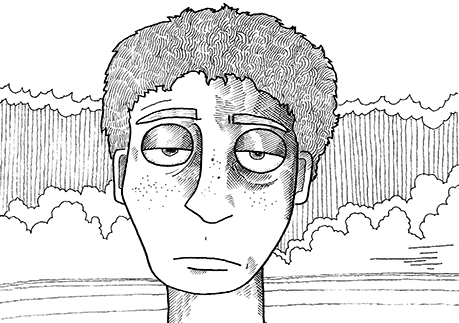

When Justin Hubbell was a kid, he wanted to die.
Hubbell said he still questions why, at age 9, he wanted to end it all because his “loneliness [was] 10 times stronger than reality.” But he decided to make a graphic novel called “Suicide,” relating his life to others who also felt in the dark.
“I think depression is one of the major problems that everyone goes through that we don’t really talk about,” Hubbell said. “What’s remarkable about it is that I think almost everyone goes through it at one point or another on varying levels. Even though we all have this in common, the funny thing about depression is that it makes you feel like you’re the only one going through it.”
Hubbell, who graduated from SUNY New Paltz with a major in printmaking and a minor in Black Studies, started working on a manuscript for the graphic novel in college.
He said he had started sketching comics about his childhood and the more he did, the “darker they got.”
“I realized I had to get this burden I had off of my back,” he said. “Up until that point I hadn’t told anyone really that not only had I grown up with depression, but that I had tried to kill myself on multiple occasions and that my childhood sort of stunk.”
Hubbell’s work centers around the theme of isolation. When he first wrote the manuscript, he basically told the story of his life. Now Hubbell is working on completing a newer version of the manuscript, which will be more than 300 pages. He said he is elaborating more on the details he left out in the rougher draft, where he plans to dive deeper emotionally.
Gender issues, Hubbell said, is one of the topics he is expanding upon because that played a “huge role” in why he was depressed. He said there were things he didn’t know about himself or wasn’t comfortable with that made him insecure about his own identity. Growing up, he said he was haunted by the fact that he was bisexual and it added to his depression.
Initially, he chose to take it out of his manuscript.
“I didn’t want people to go, ‘Oh, that’s why he was depressed. This is just another gay story or whatever,’” he said.
Hubbell said in college he struggled with a lot of the incidents from his childhood, including his identity, bullying and a rough home life. He said when he was a freshman he was uncomfortable with himself but was revitalized after taking an Intro to Black Studies course with Dr. Karanja Keita Carroll, an assistant professor in the Black Studies Department.
Hubbell said he was introduced to Eastern worldviews in the class that explained how people are connected to everything.
“It just helped me so much because I realized so many other things that I was obsessing over and were tormenting me were irrelevant,” he said. “I wasn’t really being who I wanted to be. And so in college I strove to become who I wanted to be and I was just so much happier. Through Black Studies I could be alone and I was totally comfortable with it as before if I was alone it was a bad thing.”
Depicting vulnerability is what helps Hubbell recreate his honesty. He said
artists like Alison Bechdel, Robert Crumb and David Mazzucchelli talk about themselves through their work, which helps validate what Hubbell does.
“[They’re] people who are brave enough to really explore who they are and what they’re about,” he said. “I think the theory all these people sort of run by is, ‘If I talk about myself, if I explore myself, then I’ll know more about everything else.’”
“Suicide” reveals facts about depression and Hubbell’s insights on his personal issues: within the first few panels he wrote, “Every year, 22 percent of depressed children will attempt suicide. Most will survive but only because they do not have access to dangerous substances or guns. Without them, most of us have tried strangling, poisoning or
cutting.”
The character appearing within the comic is Hubbell himself. His drawings incorporate his lifestyle at home, school and other places that made him feel alone.
Hubbell has been slowly releasing pages from “Suicide” each week on his Facebook page, “Fans of Justin Hubbell,” and his website, justinhubbell.com. The website is filled with many of his other comics which he said were all jokes or one-liners. He said he felt he hadn’t really talked about anything or had any real stories with these comics.
Hubbell said getting “Suicide” published could be a daunting task, but he is willing to take on the challenge.
“If I get this published, I can sort of market it toward schools and younger people just because I think people are more likely to read a comic about depression than a book on depression by a doctor or psychologist,” Hubbell said.
